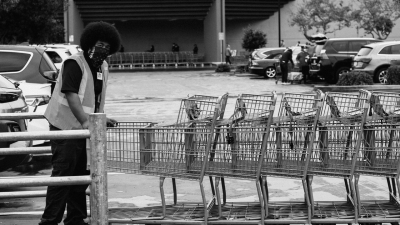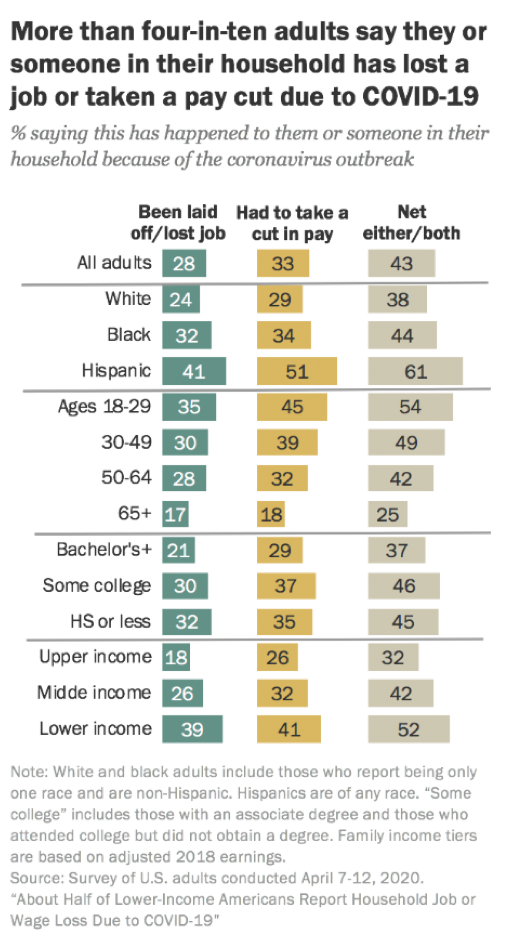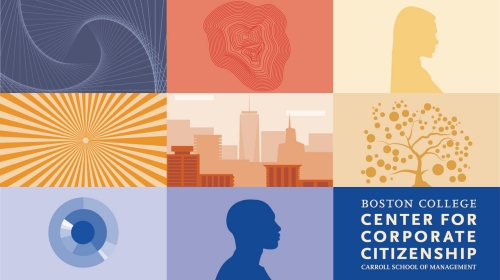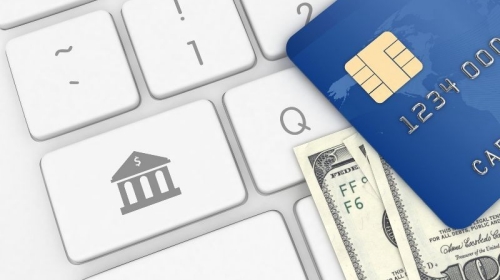WEBINAR: Hear from leaders of corporate citizenship programs on how they define the factors causing food insecurity and the programs they have created to address food disparities.
Inclusion and Diversity and COVID-19

While there is much discussion of returning to old routines, the evidence that the COVID-19 pandemic is disproportionately affecting the health and the economic resilience of our most vulnerable populations gives cause to rethink our assumptions and investments and to commit to creating a “new normal.”
We often talk about corporate citizenship as the means to create not only the world in which we want to do business; but also as a means to create the world in which we want to live. Never has there been such an opportunity to examine our assumptions about how that world works and for whom.
It has become common knowledge that COVID-19 is especially deadly among the elderly and those with preexisting conditions. Last month the CDC reported that people of color have borne a disproportionate share of serious infections. While Black individuals account for just 18% of the population, the CDC found that this group accounted for 33% of the patients hospitalized for COVID-19 in March.[1] Experts attribute this racial disparity to deep structural and systemic differences in health care access, household density, unemployment, and pervasive discrimination.[2]
Certain demographic groups are also more likely to have suffered economically from social distancing measures. While women in the workforce briefly outnumbered men earlier this year, that has since ended as they accounted for a majority of the increase in job losses last month.[3] Women workers are highly concentrated in pandemic-hit industries such as restaurants and hospitality, and more likely to have increased childcare needs due to school and daycare closures.[4] Recent Pew data also reveals that a majority of all Hispanic adults (61%) say that either they or someone in their family has lost a job or had a pay cut due to the pandemic, compared with 44% of Black adults and 38% of White adults.[5] (See Figure 1.) Similar data shows that younger workers (aged 18-29), who are especially likely to work in industries that have experienced layoffs or furloughs amid social distancing rules, also have a higher percentage of un- or under-employment.[6]
Because our old system is in such a tremendous state of disruption, many things will have to be rebuilt. This is the perfect time to think about what we can change for the better. The pandemic is shedding light on the many institutions, in the public and private sector alike, that suffer from bias and result in inequalities. The spring 2020 update of the Edelman Trust Barometer notes that 60 percent of people expect companies to lead and about as many feel that they are falling short on a number of dimensions currently.[7] Companies have resources and expertise that confer the power to drive positive change in how societal systems can become more fair and equitable to all people. We’ve seen corporate leaders step up and take the lead on issues including climate change and LGBTQ rights. There is an opportunity to do so now, and many companies are stepping forward in myriad ways as you can see in our catalogue of Covid-19 responses.
While the issue of inequality and its effect on the COVID-19 pandemic is huge and complex, here are some actions that corporate citizenship professionals can take now to begin to address it:
Raise organizational awareness and provide employee support
While most inclusion and diversity policies and procedures in our companies lie under the purview of human resources, as corporate citizenship professionals we have the responsibility to elevate awareness and raise concerns about inequalities among employees, customers, community members, and other key stakeholders. For example, if you have employee resources groups (ERGs) to support certain worker populations, tap into them to see if/how they have been discussing COVID-19 to see how you might address their specific issues with your corporate citizenship programs or socialize them with HR. Now more than ever, it is paramount that CSR departments continue to offer ERG programs and supporting resources such as mentorship programs, which allow employees to connect with one another and provide mentoring and learning opportunities in this time of remote work. Can you promote job shares or furloughs that keep more people benefits-eligible even if the company cannot afford to keep a full payroll? Your reputational capital from implementing programs such as these could turn out to be a competitive advantage when labor becomes a seller’s market again (as it was just before the pandemic).
Shift philanthropic focus as needed to address emerging concerns
As new needs are arising in our current context, keep your eyes open for opportunities to alleviate the amplified hardship faced by diverse populations. Like many other companies, such as Target and Insperity, you can consider starting or ramping up an employee relief fund to help employees support each other, especially essential workers. Within your community, you could do what BBVA has done and focus your philanthropy on supporting low- to moderate- income communities, which the Federal Reserve reports have been inversely impacted by the COVID-19 crisis.[8] In the domain of small business support—where there is mounting evidence to suggest that businesses owned by people of color have faced additional barriers in securing federal funding[9]— companies such as Verizon have implemented new small business grants with the help of community partners.
Face your own bias and strive to eliminate it
Unconscious bias in giving is unfortunately very real. One recent study, for example, found that revenues of nonprofits with a Black leader at the helm are 24% smaller than that of their White-led counterparts, and among early-stage organizations, there is an average racial funding gap of $20 million.[10] The researchers do not attribute this to overt discrimination but rather to the disparities in connections to social networks, interpersonal bias in the relationship-building required to create robust networks, and a lack of understanding about disparity and its causes among funders. Being aware of these disparities and the added barriers that organizations led by people of color face in receiving funding is a crucial first step. Some companies have gone a step further and implemented programs specifically aimed to support underserved populations—such as the Wells Fargo Foundation, which has set aside funding for Community Development Financial Institutions who serve diverse entrepreneurs during the COVID-19 pandemic.
In many ways, the pandemic has brought existing inequalities into sharp focus, especially in the areas of healthcare access and economic disparities. Corporate citizenship professionals have the opportunity to address these issues thoughtfully and meaningfully in the context of our new normal.
At the Boston College Center for Corporate Citizenship, we are here to support you through the journey of addressing inequalities in your company, communities, and beyond. For our existing resources on inclusion and diversity, members can reference Inclusion and Diversity Issue Brief and Topic Report on the subject, and stay tuned for a research update in partnership with Arconic in fall 2020.
[1] CDC. (2020, April 17). Hospitalization Rates and Characteristics of Patients Hospitalized with Laboratory-Confirmed Coronavirus Disease 2019 — COVID-NET, 14 States, March 1–30, 2020. https://www.cdc.gov/mmwr/volumes/69/wr/mm6915e3.htm.
[2] amfAR. (2020, April 15). COVID-19 Racial Disparities in U.S. Counties. https://ehe.amfar.org/inequity.
[3] Kurtzleben, D. (2020, May 9.) Women Bear the Brunt of Coronavirus Job Losses. NPR. https://www.npr.org/2020/05/09/853073274/women-bear-the-brunt-of-coronavirus-job-losses.
[4] Alon, T., Doepke, M., Olmstead-Rumsey, J., and Tertilt, M. (2020, April 14). The Impact of COVID-19 on Gender Equality. Centre for Economic Policy Research: Covid Economics, 4, 62-85. https://cepr.org/sites/default/files/news/CovidEconomics4.pdf.
[5] Brown, A., Horowitz, J.M., and Parker, K. (2020, April 21). About Half of Lower-Income Americans Report Household Job or Wage Loss Due to COVID-19. Pew Research Center. https://www.pewsocialtrends.org/2020/04/21/about-half-of-lower-income-americans-report-household-job-or-wage-loss-due-to-covid-19/.
[6] Bateman, N, and Ross, M. (2020, May 7). We can’t recover from a coronavirus recession without helping young workers. Brookings Institution. https://www.brookings.edu/research/we-cant-recover-from-a-coronavirus-recession-without-helping-young-workers/.
[7] Edelman. (2020, May 5). 2020 Edelman Trust Barometre Spring Update: Trust and the COVID-19 Pandemic. https://www.edelman.com/research/trust-2020-spring-update.
[8] Board of Governors of the Federal Reserve System. (2020, May). Report on the Economic Well-Being of U.S. Households in 2019, Featuring Supplemental Data from April 2020. https://www.federalreserve.gov/publications/files/2019-report-economic-well-being-us-households-202005.pdf.
[9] Center for Responsible Lending. (2020, May 19). The Paycheck Protection Program Continues to be Disadvantageous to Smaller Businesses, Especially Businesses Owned by People of Color and the Self-Employed. https://www.responsiblelending.org/sites/default/files/nodes/files/research-publication/crl-cares-act2-smallbusiness-apr2020.pdf.
[10] Bradach, J., Dorsey, C., and Kim, P. (2020, May). Racial Equity and Philanthropy. The Bridgespan Group and Echoing Green. https://www.bridgespan.org/bridgespan/Images/articles/racial-equity-and-philanthropy/racial-equity-and-philanthropy.pdf.
Related Content
This meetup explored two different philanthropic approaches: company-led and foundation-led corporate giving. Our speakers shared insights from their experiences, highlighting the pros and cons of both models.
WEBINAR: This research unpacks 2024 data on the roles, responsibilities, development, and compensation of people working in your field. The findings provide insight into how professionals at all levels assess the skills they need to be effective, and what they perceive as the greatest challenges they must overcome.
Profile of the Professionals reports provide insight into how professionals at all levels assess the skills they need to be effective in their roles. This report focuses on the energy industry.
Profile of the Professionals reports provide insight into how professionals at all levels assess the skills they need to be effective in their roles. This report focuses on the insurance industry.
Profile of the Professionals reports provide insight into how professionals at all levels assess the skills they need to be effective in their roles. This report focuses on the health care industry.
Profile of the Professionals reports provide insight into how professionals at all levels assess the skills they need to be effective in their roles. This report focuses on the financial industry.
Profile of the Professionals reports provide insight into how professionals at all levels assess the skills they need to be effective in their roles. This report focuses on the manufacturing and transportation industries.








